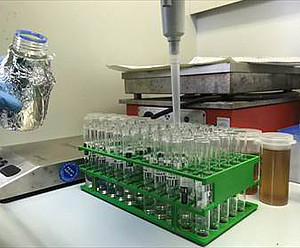Deployment of phosphate resources for nutrient recycling via anaerobic digestion systems
Residues from agriculture and food production, excrements from humans and livestock and other organic wastes are often neglected resources for nutrient recovery. Anaerobic digestion can be used to partly decompose these residues and create a fertilizer with high nutrient availability. This nutrient recycling is essential for future high yield agriculture. Simultaneously an energy-rich gas is generated that can be used to cover everyday needs such as heating and cooking or for electricity production.
 The goal this research is to evaluate the potential recovery of phosphate from the available organic wastes or byproducts in Germany and China. Secondly, the phosphate turnover during anaerobic digestion will be evaluated. It is hypothesized that an enhanced phosphate recovery can be achieved while maintaining high gas yields.
The goal this research is to evaluate the potential recovery of phosphate from the available organic wastes or byproducts in Germany and China. Secondly, the phosphate turnover during anaerobic digestion will be evaluated. It is hypothesized that an enhanced phosphate recovery can be achieved while maintaining high gas yields.
The biochemical conversion of organic matter during anaerobic digestion is a complex process and benefits from the symbiosis of bacteria and archaea in an anaerobic environment. The microorganisms metabolize different compounds resulting in composition and decomposition of phosphates along the digestion path. The fate of phosphate will be evaluated in batch and continuous-digestion experiments and process parameters will be adjusted to optimize the constitution of digestate towards enhanced fertilization attributes.